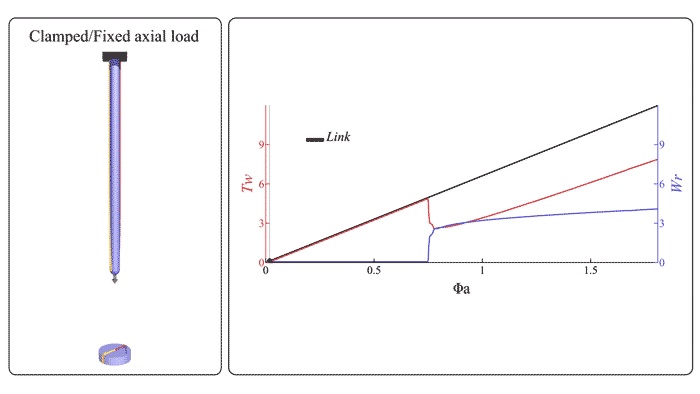Get the latest international news and world events from around the world.
Mesmerizing 3D printing technique
A new 3D printing technique switches between ‘inks’ so fast you can’t even see it.

Research sheds light on the underlying mechanics of soft filaments
Artificial muscles will power the soft robots and wearable devices of the future. But more needs to be understood about the underlying mechanics of these powerful structures in order to design and build new devices.
Now, researchers from the Harvard John A. Paulson School of Engineering and Applied Sciences (SEAS) have uncovered some of the fundamental physical properties of artificial muscle fibers.
“Thin soft filaments that can easily stretch, bend, twist or shear are capable of extreme deformations that lead to knot-like, braid-like or loop-like structures that can store or release energy easily,” said L. Mahadevan, the Lola England de Valpine Professor of Applied Mathematics, of Organismic and Evolutionary Biology, and of Physics. “This has been exploited by a number of experimental groups recently to create prototypical artificial muscle fibers. But how the topology, geometry and mechanics of these slender fibers come together during this process was not completely clear. Our study explains the theoretical principles underlying these shape transformations, and sheds light on the underlying design principles.”

Broadband satellite to serve Pacific islands delivered to Florida launch base
A powerful commercial communications satellite to broadcast Internet signals over the Asia-Pacific region has arrived at Cape Canaveral for final launch preparations ahead of a planned Dec. 15 liftoff on top of a SpaceX Falcon 9 rocket.
The JCSAT 18/Kacific 1 communications satellite, based on Boeing’s 702MP satellite design, is a shared spacecraft between Sky Perfect JSAT Corp. of Japan and Kacific, a startup telecom company headquartered in Singapore.
Kacific announced the satellites’s arrival at Cape Canaveral on Thursday. Ground crews will complete final testing on the spacecraft and load it with maneuvering propellant ahead of its launch next month.
Today’s episode is a special one—we begin a new season of X10 with a new co-host, who will quiz Giuliano and Nicola on depictions of life extension in fiction
How well will they do, and is life extension accurately portrayed in popular fiction? Let’s find out!


Tours: I went to Taliesin West In Scottsdale, though I think Of it as Phoenix With my so, Jerry
Taliesin Preservation offers a variety of tours of the Taliesin estate in Spring Green, Wisconsin. These tours are designed for every level of interest. Booking tours in advance is strongly recommended. Tours often sell out, so book well in advance of your preferred tour date. Walk-ins are accommodated with space permitting.

Is death optional? ⇒ Kirno Sohochari
Merging of human biological arrangements with nonbiological machine hardware is perhaps not fairy at all. Futurist Ray Kurzweil mentioned his fairy dream over again that the historic Homo sapiens are not so far remote to the fifth epoch revolution. They human species is cramped to leave their biological genes and sluggish brain circuitry to merging them with the electrified hardware and fastest machine intelligence. Merging with electrified intelligence is unavoidable because of the slow computation power of human brain circuitry. Information processing and its exchanging ratio of a biological brain are extremely sluggish compared to the nonbiological brain. Despite its amazing innovative capacity of thinking, envision or consciousness, the human brain looks crawler if a goosey person even observes the current computation pace of nonbiological machine-brain for instance.
… Daniel Kahneman’s evidential works help readers summate the conclusion that the battle amid desire and choice is not an episodic whiff of latter, nor anybody can consider it a consequent tethering of modernity, rather the prehistoric beginning was also alluring by this in a bit different context. Memory-preserver neuron cells how to make a deep impact on human happiness levels have appeared crucial in Kahneman’s investigation. … …
Harari’s conversation with Kahneman echoed his historical findings that how human species manipulate Nature in an excuse to achieve individuality and happiness. He put forward statistical references to establish his findings of the behavioral shifting of human civilization; that is,— the personification of Naturebond life then diverts human species to a different track. They missed the integrity of taking Holistic View that a ‘piece or segment’ is ultimately the part of a ‘whole’ and any partial piece or segment never sustains long if it failed attached itself to the whole. Lil bit reminder of Chief Seattle’s Letter may relevant here. It is said that the native leader once wrote a letter to the President of the United States addressing the burning land settlement issues against his tribe:
How can you buy or sell the sky, the warmth of the land? The idea is strange to us… If we do not own the freshness of the air and the sparkle of the water, how can you buy them?… So, when the Great Chief in Washington sends word that he wishes to buy our land, he asks much of us… The air is precious to the red man for all things share the same breath, the beast, the tree, the man, they all share the same breath. The white man does not seem to notice the air he breathes. Like a man dying for many days, he is numb to the stench. But if we sell you our land, you must remember that the air is precious to us, that the air shares its spirit with all the life it supports… This we know; the earth does not belong to man; man belongs to the earth. This we know. All things are connected like the blood which unites one family. All things are connected. [See: Chief Seattle’s Letter to the President of the United States: Ted Perry’s version from the movie ‘Home’ ].
